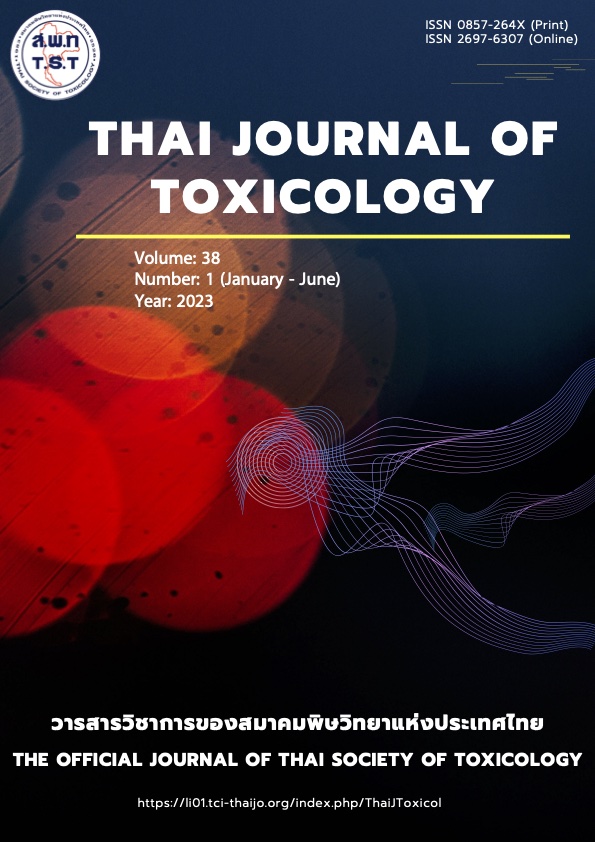Chronic Toxicity of Abelmoschus esculentus (L.) Extract in Rats
Main Article Content
Abstract
Abelmoschus esculentus (L.) have been launched and consumed widely by the public. However, the toxicity and safety data of the plant extract are still limited. The chronic toxicity of the aqueous extract of A. esculentus was investigated through the rat's oral route for 180 days. The results revealed that health, food consumption and hematological values in all AEW-treated groups were not different from those of the control groups. However, male rats that received AEW at 1000-R mg/kg/day had significantly fewer creatinine levels, higher BUN levels and higher uric acid than the control group. Moreover, female rats that received AEW at 1000-R mg/kg/day had significantly fewer creatinine levels at 125 mg/kg/day significantly higher uric acid as well as higher sodium levels at 125, 250, and 1000-R mg/kg/day than the control group. More interestingly, the glucose level showed less than the control group in a dose-response manner. Histopathology of visceral organs indicated no significant lesion related to the extract in both male and female rats. In conclusion, AEW extract at the doses tested does not produce serious chronic toxicity in rats. Nevertheless, it should be careful using on individuals who have specific underlying conditions.
Article Details
References
ราชบัณฑิตยสถาน. อนุกรมวิธานพืช อักษร ก. กรุงเทพฯ: เพื่อนพิมพ์. 2538.
สุภาภรณ์ ปิติพร.กระเจี๊ยบเขียว แหล่งกลูต้าไทโอน ราชาสารต้านอนุมูลอิสระ. วารสารหมอชาวบ้าน 2557; 35 (419): 24-6.
OECD Guideline for testing of chemicals. Chronic Toxicity Studies, 2020 Available at: https://www.oecdilibrary.org/docserver/9789264071209en.pdf?expires=1680233021&id=id&accname= guest&checksum=7D65B425B93F33 8DDE7020C1F7CF73B2, accessed on Oct 10, 2020.
Prommuak C, D-Eknamkul W, Shotipruk A. Extraction of flavonoids and carotenoids from Thai silk waste and antioxidant activity of extract. Sep Purif Technol 2008, 444-8.
Thai Pharmacopoeia. Ministry of Public Health; Department of Medical Sciences. Nonthaburi. 2003; 2: part 3
Thai Pharmacopoeia. Ministry of Public Health; Department of Medical Sciences. Nonthaburi. 2003; 1: part 1
Ostermann M, Kashani K, Forni LG. The two sides of creatinine: both as bad as each other. J Thorac Dis 2016; 8: 28-30.
Husen SA, Winarni D, Ansori ANM, et al. Antioxidant potency of okra (Abelmoschus esculentus l. moench) pods extract to ameliorate kidney structure and function in diabetic mice. Ecol Environ Conserv 2020; 26: 1764-8.
Ilango KB, Pradeep LA, Vetrivel D, et al. Safety evaluation of Abelmoschus esculentus polysaccharide. Int J Pharm Sci Rev Res 2011; 10: 106-10.
Nasrollahi Z, ShahaniPour K, Monajemi R, et al. Abelmoschus esculentus (L.) Moench improved blood glucose, lipid, and down-regulated PPAR-α, PTP1B genes expression in diabetic rats. J Food Biochem 2022; 46: 1-12.
Aleissa Mohammed AL-Zharani S, Alneghery LM, Saquib Hasnain Md, et al. Comparative study of the anti-diabetic effect of mucilage and seed extract of Abelmoschus esculentus against streptozotocin-induced diabetes in rat model. J King Saud Univ Sci 2022; 34: 1-9.
RCC, Inc. Historical control data of Wistra Hannover GALAS rats. 1999.


